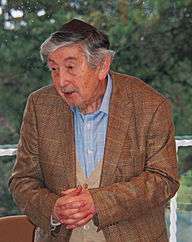Otto Hutter
| Otto Hutter | |
|---|---|
|
Hutter speaking at his 90th birthday | |
| Born |
Otto Fred Hutter 29 February 1924 Vienna, Austria |
| Residence | Bournemouth, England |
| Citizenship | British (since 1947) |
| Fields | |
| Institutions | |
| Alma mater | University College London |
| Doctoral advisor | Sir Charles Lovatt Evans |
| Notable students |
|
| Known for |
|
| Notable awards |
|
| Spouse | Yvonne Hutter |
Otto Fred Hutter (b 29 February 1924) Emeritus Regius Professor of Physiology at the University of Glasgow, is a physiologist. He was born in Vienna, becoming a British citizen in 1947.,[1][2] His father was an estate agent and his mother had been a nurse in World War 1. He first attended secondary school at the Zwi Perez Chajes Gymnasium. He left Vienna in December 1938[1] as part of the Kindertransport which allowed Jewish children to escape the German occupation. After arriving in the UK, he attended the Bishop Stortford College as a boarder. From 1942, after leaving school, he worked as a laboratory technician at the Wellcome Physiological Research Laboratories in Beckenham, Kent. One project addressed the standardisation of penicillin production, then of considerable importance for the war effort.
He studied physiology at Chelsea Polytechnic (as was) and chemistry at Birkbeck College at wartime evening classes. When the war ended, he took the BSc Physiology course at University College London. His initial research was on acetylcholine actions in nerve and muscle. His work developed to address the permeation of potassium in muscle. During a research fellowship in Baltimore, at the laboratory of Stephen Kuffler, he worked with another visitor, Wolfgang Trautwein. They made the first recordings using microelectrodes of the pacemaker potential in heart muscle to study the cardiac pacemaker. They researched the actions of acetylcholine (which slows heart rate) or adrenaline (which speeds it). Their recordings, made in tortoise heart, have become iconic medical and physiological textbook images of these phenomena.[3]
References
- 1 2 Tansey, Tilli; Rosenberg, Martin. "An interview with Otto Hutter" (PDF). Physiological Society. Retrieved 29 July 2015.
- ↑ University of Glasgow. "Biographical Webpage".
- ↑ Miller, David. "My Top Ten Cardiac Muscle Papers". Retrieved 29 July 2015.
